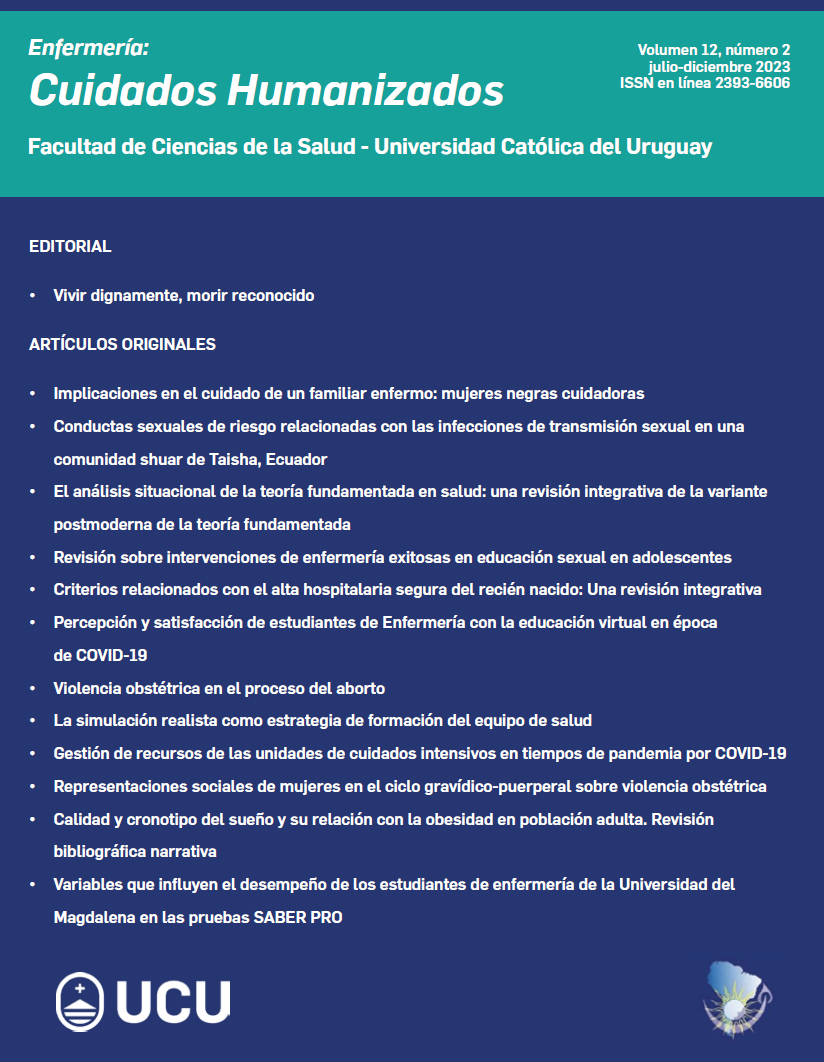Social Representations of Women in the Pregnancy-Puerperal Cycle on Obstetric Violence
DOI:
https://doi.org/10.22235/ech.v12i2.3273Keywords:
pregnancy, postpartum period, obstetric violence, health care, nursingAbstract
Objectives: To trace the biopsychosocial characteristics of women in the pregnancy-puerperal cycle and to analyze the social representations of these women on obstetric violence. Methodology: Descriptive study, qualitative approach, guided by the Theory of Social Representations conducted in the period from September 2021 to April 2022, with 40 women assisted in a maternity hospital in Minas Gerais, Brazil. The data was collected through a script of semi-structured interview and the technique of free association of words. The characterization was analyzed by simple descriptive statistics, the semi-structured interview by the thematic content technique proposed by Bardin and the free word association technique by Iramuteq software. Results: 82.5 % of the participants had a range of 18 and 29 years, 77.5% self-identified as pardas (mixed race), 25 % had completed high school and 65 % reported income from 1 to 3 minimum wages. Regarding obstetric history, 52,0% had gestational age between 37 and 41 weeks, 70.0% had not planned pregnancy, 42.5% had been admitted for labor and 87.5% were monitored. Obstetric violence is represented by women in a superficial way with a focus on the physical and emotional dimension, being in some moments naturalized. Conclusion: Obstetric violence is a serious problem experienced by the female public and the lack of knowledge can lead to naturalization, leaving them in a position of broad vulnerability.
Keywords: Pregnancy; Postpartum period; Obstetric violence; Health care; Nursing.
Downloads
References
Sturza JM, Nielsson JG, Andrade EP. Violência Obstétrica: uma negação aos Direitos Humanos e a saúde sexual e reprodutiva da mulher. Revista Juris Poiesis. 2020;23(32):380-407. Disponível em: http://periodicos.estacio.br/index.php/jurispoiesis/article/view/8643/47967016
Galiano JMM, Vazquez SM, Almagro JR, Martinez AH. The magnitude of the problem of obstetric violence and its associated factors: A cross-sectional study. Women and birth: Journal of the Australian College of Midwives. 2021;34(5):526-536. doi: 10.1016/j.wombi.2020.10.002
Albuquerque A, Oliveira LGSM. Violência obstétrica e direitos humanos dos pacientes. Revista CEJ. 2018;(75):36-50 Disponível em: https://bdjur.stj.jus.br/jspui/handle/2011/126638
Rodrigues FAC, Lira SVG, Magalhães PH, Freitas ALV, Mitros VMS, Almeida PC. Violência obstétrica no processo de parturição em maternidades vinculadas à Rede Cegonha. Reprodução & Climatério. 2017;32(2):78-84. doi: 10.1016/j.recli.2016.12.001
Oliveira LLF, Trindade RFC, Santos AAP, Araújo BRO, Pinto LMTR, Silva LKB. Violência obstétrica em serviços de saúde: constatação de atitudes caracterizadas pela desumanização do cuidado. Rev. enferm. UERJ. 2019;(27):1-8. doi: 10.12957/reuerj.2019.38575
Martins ACM, Giugliani ERJ, Nunes LN, Bizon AMBL, Senna AFK, Paiz JC, et al. Factors associated with a positive childbirth experience in Brazilian women: A cross-sectional study. Women and Birth. 2021;34(4):e337-e345. doi: 10.1016/j.wombi.2020.06.003 PMID: 32653397
Oliveira TR, Costa REOL, Monte NL, Veras JMMF, Sá MIMR. Percepção das mulheres sobre violência obstétrica. Rev. enferm. UFPE on line. 2017;11(1):40-46. Disponível em: https://periodicos.ufpe.br/revistas/revistaenfermagem/article/view/118767
Ribeiro DO, Gomes GC, Oliveria AMN, Avarez SQ, Gonçalves BG, Acosta DF. The Epistemic Injustice of Obstetric Violence. Rev. Estud. Fem. 2020;28(2):1-12. doi: 10.1590/1806-9584-2020v28n260012
Paula E, Alves VH, Rodrigues DP, Felicio FC, Araújo RCB, Chamilco RASI. Obstetric violence and the current obstetric model, in the perception of health managers. Texto & contexto enferm. 2020;(29):1-14. doi: 10.1590/1980-265X-TCE-2019-0248
Santos ALM, Bckes MTS, Smeha LN, Freitas HMB, Souza MHT. Violência obstétrica: percepção dos profissionais de enfermagem acerca do cuidado. Disciplinarum Scientia. 2018;19(2):301-309. doi: 10.37777/2514
Bardin L. Análise de Conteúdo. São Paulo (SP): Edições 70; 2016.
Sousa YSO. O uso do Software Iramuteq: Fundamentos de Lexicometria para pesquisas qualitativas. Estud. pesqui. psicol. 2021;21(4):1542-1560. doi: 10.12957/epp.2021.64034
Brasil. Ministério da Saúde. Resolução n.º 466, de 12 de dezembro de 2012. Aprovar as diretrizes e normas regulamentadoras de pesquisas envolvendo seres humanos. Brasília: MS; 2012. Disponível em: https://conselho.saude.gov.br/resolucoes/2012/Reso466.pdf
Brasil. Ministério da Saúde. Conselho Nacional de Saúde. Resolução nº 510, de 7 de abril de 2016. Trata sobre as diretrizes e normas regulamentadoras de pesquisa em ciências humanas e sociais. Brasília: MS; 2016. Disponível em: https://conselho.saude.gov.br/resolucoes/2016/Reso510.pdf
Palmarella VP. Conhecimentos e experiências de violência obstétrica em mulheres que vivenciaram a experiência do parto. Enfermería Actual de Costa Rica. 2019;(37):66-79. doi: 10.15517/revenf.v0ino.37.35264
Assis JF. Interseccionalidade, racismo institucional e direitos humanos: compreensões à violência obstétrica. Serv. Soc. Soc. 2018;(133):547-565. doi: 10.1590/0101-6628.159
Melo BLPL, Moreira FTLS, Alencar RM, Magalhães BC, Cavalcante EGR. Violência obstétrica à luz da Teoria da diversidade e Universalidade do Cuidado Cultural. Rev. Cuid. 2018;13(1):1-16. doi: 10.15649/cuidarte.1536
Palma CC, Donelli TMS. Violência Obstétrica em mulheres brasileiras. Rev. Psicol. 2017;48(3):216-230. doi: 10.15448/1980-8623.2017.3.25161
Martins FL, Silva BO, Carvalho FLO, Costa DM, Paris LRP, Junior LRG, et al. Violência Obstétrica: Uma expressão nova para um problema histórico. Saúde Foco. 2019;(11):413-423. Disponível em: https://portal.unisepe.com.br/unifia/wp-content/uploads/sites/10001/2019/03/034_VIOL%C3%8ANCIA-OBST%C3%89TRICA-Uma-express%C3%A3o-nova-para-um-problema-hist%C3%B3rico.pdf
Madeira DFP, Queiroz MLS, Toleto RL. Violência Obstétrica: a relação entre violação do direito à assistência obstétrica humanizada e o patriarcado. Saúde, Gênero e Direito. 2020;9(4):1-41. Disponível em: https://periodicos.ufpb.br/index.php/ged/article/view/51799
Silva SES, Gasperin HG, Pontes FS. A violência obstétrica e o despacho do Ministério da Saúde. Tensões Mundiais. 2021;17(33):205-228. Disponível em: https://revistas.uece.br/index.php/tensoesmundiais/article/view/3076/4476
Nascimento FC, Silva MP, Viana MRP. Assistência de enfermagem no parto humanizado. Rev. Prev. Infecç. e Saúde. 2018;4:6887. doi: 10.26694/repis.v4i0.6821
Hameed W, Uddin M, Avan BI. São mulheres desprivilegiadas e menos empoderadas privadas de cuidados de maternidade respeitosos: desigualdades nas experiências de parto em unidades de saúde pública no Paquistão. PLoS One. 2021;16(4):e0249874. doi: doi: 10.1371/journal.pone.0249874 PMID: 33858009
Swahnberg K, Schei B, Hilden M, Halmesmaki E, Sidenius K, Steingrims-Dottir T, Wijma B. Patients experiences os abuse in health care: a Nordic study on prevalence and associated factors in gynecological patients. Acta Obstet Gynecol Scand. 2007;86(3):349-356. doi: 10.1080/00016340601185368
Flores YYR, Ibarra LEH, Ledezma AGM, Acevedo CLG. Social construction of obstetric violence of Tenek and Nahuatl women in Mexico. Rev. Esc. Enferm. USP. 2019;53(9):1-7. doi: 10.1590/s1980-220x2018028603464
Gebeyehu NA, Adella GA, Tegegne KD. Desrespeito e abuso de mulheres durante o parto em unidades de saúde na África Oriental: revisão sistemática e meta-análise. Front Med (Lausanne). 2023;10:1117116. doi: 10.3389/fmed.2023.1117116 PMID: 37153101
Nunes GFO, Melo DEB, Espínola MMM, Matos KKC, Viana LSS. Violência obstétrica na visão de mulheres no parto e puerpério. Perspectivas Online: Biológicas & Saúde. 2020;10(35):12-29. doi: 10.25242/8868103520202086
Downloads
Published
How to Cite
Issue
Section
License
Copyright (c) 2023 Enfermería: Cuidados Humanizados

This work is licensed under a Creative Commons Attribution 4.0 International License.

















